
Arquivo para a ‘Social Network’ Categoria
The pandemic and the doxa
Mere opinion on topics as complex as the treatment of the pandemic  exposed the world to mere opinion or “doxa” as the Greeks called what was opposed to episteme or organized and systematized knowledge.
exposed the world to mere opinion or “doxa” as the Greeks called what was opposed to episteme or organized and systematized knowledge.
The number of curious solutions in the fight against the virus is enormous: using lemon to ozone, the remedies that are effective for other diseases such as the use of chloroquine for malaria, uses of teas and hot water, certain fruits and vegetables, FioCruz that accompanies the Oxford vaccine development carried out a survey, which gives 73% of the news about coronavirus cures as false, mostly home recipes with no effect on the disease.
All life in Plato’s time (428/427 BC – 348/347 BC) happened around the polis, where there was already the citizen of the polis, the politician, but still dominated the sophists, who sought only arguments to favor power , without worrying about justice and truth.
In the book Plato’s Republic the term episteme, which previously supported the possibility of being a skill for something, now acquires the content of knowledge full of certainty, an evident knowledge that is linked to the reality of Eidos (the Idea for the ancients), with this episteme is true knowledge and totally opposed to doxa, reduced to simple opinion.
It is in the relationship between epistemology and ethics, that it is possible to consider the action from a doxa point of view, although it does not mean a basis for this type of ethical knowledge in Plato, as he will appear with Aristotle (384 BC – 322 BC), in particular in his book “Ética a Nicômaco”.
The problem of determining these concepts by linking them to ethical issues appears in the first dialogues until the Republic, which remains afterwards in the dialogues about the Laws, making it possible to address this issue in later dialogues.
Plato uses the concepts of nous (Republic VI 511d4) and noesis (Republic VI 511e1), the doxa is in the world of sensitive reality, while the episteme is in dianoetic knowledge (dianoia, it is the way of thinking lower than noesis) that its object is the noeta, but they are inferior to the dialectic (República VII 533d).
Aristotle will deny the existence of eide (pure thought) in Platonic terms, so his episteme will designate for him the knowledge of the necessary causes (it is developed in the first analytics) and consists of demonstration (apodeixis) and sensation (aisthesis) becomes if necessary for the episteme.
In order not to complicate too much, the Greeks are, it is in Metaphysics (E 1, 1025b-1026a.) That the term episteme will designate a systematic organization of rational knowledge, thus coming to point to theoretical knowledge, in opposition to practical knowledge and poietic (Nicomachean Ethics VI 3, 1139b14-36).
Whatever the form of systematic knowledge, science has its ways and to deny them is to put all of humanity to the test, neither home recipes nor vaccines without the conditions for testing are acceptable, caution is necessary, we have already paid a price too much for deaths in the pandemic, the cure is to eliminate the possibilities of reinfection and side effects, it is the dose of the poison that makes the medicine, but the reverse is also true.
The pandemic and Areté
Areté was for the Greeks a set of virtues that should be exercised to avoid an even greater crisis in Greek democracy.
to avoid an even greater crisis in Greek democracy.
Although it is linked to moral virtue, in the Greek sense, of course, two characteristics of areté are necessary at this time of the pandemic: prudence and perfect adaptation.
The conditions of the pandemic will require everyone to adapt, the numbers of infected and dead evolve in a stable curve, but in absolute numbers it means a daily increase in the thousands of deaths, and millions of infected, care must be taken and it means an adaptation the current situation, a new uncertain uncertainty will come, what we are experiencing now is an adaptation to an exceptional situation.
Prudence must be in our mind, it is a situation of limitations, but if taken seriously it makes everyday life less tense, health and political authorities must also take care when adopting vaccines, in addition to health there are political issues and economic interests involved, and again health should take priority, every precaution in adopting the vaccine will be necessary.
The great reason that we have difficulties in complying with rules, and also having sensitivity and respect when complying with them, is that virtues are not in fashion, fashion is full freedom, and it is never possible because of social laws and rules of good coexistence, in a period of a completely exceptional state requires from everyone even more disciplined attitudes, hygiene, social distance and delicacies.
Solidarity is another value that must return to fashion because many people needed our understanding in order to have their survival guaranteed, there is no lack of campaigns and attitudes it is true, but it will be necessary an even greater effort so that everyone really has the minimum dignity to live .
The Greeks who built the first model of polis, can help us to correct values that contemporary culture has corrupted, that is why, throughout the past week we have dealt with this topic, prudence and adaptation require effort so that the drama of the pandemic is not a scourge even
The tragedy of modern culture
Theodore Dalrymple, pseudonym of the English physician and 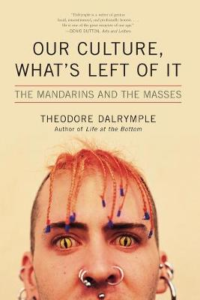 psychiatrist Anthony Daniels, who proposed a reflection on the moral decay of modern culture, the effect of the politically correct dangerous on society (as if it were a single political position) and the consequences for the true culture of peoples, your book Anything goes (2016) is a profound “clinical” analysis of what kind of cultural crisis we are experiencing.
psychiatrist Anthony Daniels, who proposed a reflection on the moral decay of modern culture, the effect of the politically correct dangerous on society (as if it were a single political position) and the consequences for the true culture of peoples, your book Anything goes (2016) is a profound “clinical” analysis of what kind of cultural crisis we are experiencing.
The author collaborates with several periodicals The Times, The Daily Telegraph, The Observer and The Spectator, it is a conservative point of view that looks at history without a doubt, but it is nevertheless important to make some observations about contemporary life and see how many others wear out the current culture.
She won her first Freedom in Flanders in 2011, a region that speaks Flemish two thirds of Belgium, after praising her as an educated woman, she will criticize her nationalism: “I requested a room… the receptionist answered me in English, but not because of my accent with my wife, who is Parisian, she did the same.
We were thus introduced to Flemish nationalism, which demonstrates that no country is too small for national separatism” (page 30), the other region is French-speaking Wallonia, but only Flemish in Flanders, even if they know French .
He reveals his true identity in the book by saying “as a doctor and psychiatrist, I spent a terrible period of my career trying to take people on a path that seemed appropriate and beneficial to them” (p. 81) and then confesses his failure, he says that their patients were “self-destructive, which, if looked at impartially and with a minimum of common sense, could not lead to anything other than anguish” (idem), but it is not their high point.
In another line, but also in defense of the culture that has arisen among the peoples of the planet, with clear and unmistakable roots, Byung-Chul Han, a Korean philosopher migrated to Germany, also criticizes the culture of the smooth, the absence of imperfections and grooves that are confused in art with the politically correct.
Wrote Byung-Chul wrote that beauty today is smooth, does not show resistance, does not break and requires likes, distance invites only touch, there is no negativity that is opposite, without it, surprise and wonder disappear: “without distance no it is possible to have mystique, demystification makes everything fruiting and consumable. ”, there is no otherness of the Other, there is only room for an aestheticized and homogenized diversity, and thus consumable and explored.
It is not about defending tradition, good critics and good reformers always engage in dialogue with the opposite side, but what is involved is forgetfulness and even contempt for the roots of each culture and a massification that wants to make everything uniform and misshapen .
It is only one side of the culture that reaches the thought that has become vulgar and sophist, of the religion that has become ideological or fundamentalist, and of the culture that we all descend from that is ignored, the social and moral consequences are only the visible part of that occurs in the foundations of modern society.
DALRYMPLE, Thedore. (2016) Qualquer coisa serve. (Our culture: what´s left of it). trad. Hugo Langone. São Paulo: É Realizações.
Waiting for a vaccine
Two vaccines are close to Brazilians due to the participation of local research institutes, the Oxford vaccine, where the Brazilian Pedro M. Folegatti is on the development team (author of the article in The Lancet magazine), in which the laboratory also participates Fio Cruz with government incentive, and the Chinese vaccine in which the USP Butantã Institute participates in the testing stage, with an agreement from the São Paulo government for development.
research institutes, the Oxford vaccine, where the Brazilian Pedro M. Folegatti is on the development team (author of the article in The Lancet magazine), in which the laboratory also participates Fio Cruz with government incentive, and the Chinese vaccine in which the USP Butantã Institute participates in the testing stage, with an agreement from the São Paulo government for development.
The fact that the British laboratory AstraZeneca, which is in the development of the Oxford vaccine, closed an agreement to produce the vaccine in China through the company Shenzhen Kangtai Biological Products, announced last Thursday, August 6, can cause confusion of interpretation. .
Vaccines also have different developments, while the Chinese vaccine follows the traditional development of vaccines for flu and some common diseases such as measles, cachumba and others, which is the development of a weaker dose of the virus itself thus producing immunity in the body, after some minor annoyances, in the case of the corona virus, a question remains, is there no possibility of reinfection, there are already cases all over the world, which are being studied.
The Oxford vaccine, which has the participation of FioCruz Brazilian Laboratory and encouragement from the Brazilian government, has already been explained in a post that is producing a non-replicating viral vector, it is modified and non-infectious, a protein hidden in the vector takes a protein that produces antibodies and immunizes the vaccinee, the Oxford laboratory says that with two doses it is 100% effective.
There are many other projects under development in the world, Chinese companies participate in addition to these two, in more than 8 of the 26 projects that lead the development of the vaccine because they are already in the stage of testing the vaccines in humans around the globe.
The race for the vaccine has two aspects, the positive is that there is a race that can bring the vaccine earlier, the other fearful is that safety steps are passed, Russia says it has a vaccine soon, but there are doubts about compliance with the protocols before mass vaccination, caution is needed.
If Europe (and the world) awakens
Peter Sloterdijk wondered if a Europe destroyed by war in 1945 could be seen as a metaphor for a modern empire and enlightened on the eve of a new century, it was a more optimistic environment of that time, but the philosopher had already predicted the violent turn of American politics and a possible world crisis.
could be seen as a metaphor for a modern empire and enlightened on the eve of a new century, it was a more optimistic environment of that time, but the philosopher had already predicted the violent turn of American politics and a possible world crisis.
The pandemic appears to have united Europe, except for the Kingdom that claims to be united, but it seems that it is not, a recovery policy that sustains the “domestic” economy, that is, those companies and businesses that traditionally support different European nations may have a new injection of spirit (and money) to recover.
Sloterdijk’s book If Europe Awakens, from 2002, had despite some optimism of a “new Europe”, the idea that Europeans do not turn to their historical-philosophical foundations to seek an orientation based on a “mitomotricity” that goes from against the founding myths that resulted from cultural, philosophical and political splendors that Europe considers itself heir, but can we think about this after a tragic crop of totalitarianism and world wars?
Edgar Morin prepares his world about the pandemic and despite all expectations, he always so optimistic now seems not to be, in an interview in November 2019 he stated that although “we walk like somnambulists towards a catastrophe”, he did not leave one tip of hope “resisting the dictate of urgency … hope is near.”
However, the climate is gloomy, with clouds hanging over China and the US, and relations with Turkey and part of the Arab world that is not so friendly with the West, what answer a boiling world may have, is the question that remains.
The spirits are high and the society of speed and fatigue does not seem to have given much space for a break, even though the pandemic imposing this on everyone, after 6 months it seems that there is no more balanced policy that convinces citizens to civility, compassion and solidarity.
In the midst of a rough sea, the disciples when they saw Jesus walking on the waves shouted “it is a ghost”, but soon He said to them “Courage! It’s me. Do not be afraid!” (Mt 14,26-27), the crisis is for the brave and the visionary, that leaders and leaders really fraternal and solidary help us in the post-pandemic and in a world with dark aspects.
Simplism or complexity
William Ockham proclaimed that between two explanations about a certain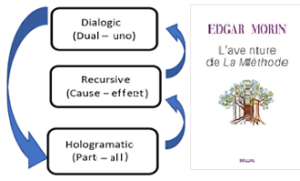 phenomenon one should stick with the simplest one, this principle became known as Ockham’s razor, but what to do with problems that are complex, as is the case of the current crisis of the corona virus, the more simplistic explanations are fake News, conspiracy theories or simple lies.
phenomenon one should stick with the simplest one, this principle became known as Ockham’s razor, but what to do with problems that are complex, as is the case of the current crisis of the corona virus, the more simplistic explanations are fake News, conspiracy theories or simple lies.
The complexity problem came from Biology, the ecological problem and the ecosystems showed that the phenomena are more interconnected than previously thought, there is a whole food chain going from the simplest, cellular to the most complex organisms and this includes the man.
However, the Arrábida Charter of Transdisciplinarity, signed by serigraphists Lima de Freitas, by Barsarab Nicolescu, written in 15 articles, highlighted “… the contemporary rupture between an increasingly accumulative knowledge and an increasingly impoverished inner being, leads to the rise of a new obscurantism, whose consequences on the individual and social level are incalculable ”(Arrábida, Portugal, 1994).
As method was Edgar Morin who thought about complexity, written in six volumes: Method 1 – The nature of nature (1977), Method 2 – The life of life (1980), Method 3 “The knowledge of knowledge” (1986), Method 4 – “Ideas: habitat, life, customs and organization” (1991), Method 5 – “Humanity of humanity: human identity” (2001), and Method 6 – “Ethics” (2004), however the epistemological question developed in a December 1983 lecture in Lisbon, which became a book, published in Portuguese in 1985.
In essence, thinking about complexity is outlined in three new concepts: the dialogical operator (understood as different from the dialectic), the recursive operator (which means understanding the consequences of acts, in a cause-effect relationship that produces a new cause) and the holographic operator (the part is in the whole and the whole is in the part, it does not separate all and part).
So it can be summarized from Transdisciplinarity to the Complex as an essential problem of humanism, we are 100% nature, 100% culture without dualism between them, solving the question of what we are as a “natural” man, as well as the ecological problem as well as the humanism are intertwined, the problem of nature is a human problem and the fundamental problem of man is his relationship with nature including the Other as part of his nature, regardless of race, color.
The historical origin of hiding pandemic data
The idea of hiding data about the pandemic had already occurred in the Spanish flu, which received this name only for political reasons since Spain remained neutral during the First World War, the original name was trench flu because it affected many soldiers and weakened some armies.
which received this name only for political reasons since Spain remained neutral during the First World War, the original name was trench flu because it affected many soldiers and weakened some armies.
The idea of hiding the disease was even supported by prestigious institutions, such as the Royal Academy of Medicine in London, until the end and 1918 few believed in the flu.
The name of Spanish influenza is also old, Brazilian newspapers (there was an article from the magazine A Careta, n. 537) used the name but as now the beginning of the fight against the disease was troubled, and the coercive measures defended by the sanitary Oswaldo Cruz were seen as a sanitary tyranny in the country and political groups opposed to the Wenceslau Braz (see the Brazilian daily) government saw the flu as a government pretext for intervention in the lives of the population.
Political use has also been made, but at this serious moment in history, it is desirable that true humanitarian spirits disarm themselves to defend the lives of the population, the action of doctors, aid groups and efforts for the vaccine.
The insistence on polarizing in such a tragic moment reveals only the decadence of the most expensive values of compassion and solidarity, even by groups that should be more committed to joining efforts, and curiously we find even those on the other side of both solidarity and those seeking divert attention from the real enemy: the pandemic that affects everyone.
In the country, lost the opportunity to do a #lockDown when the disease was still located in some regions, now it has spread throughout the country and only the measures already known should continue to be adopted, I see medical teams and support services reaching depletion , the cases of infection of this true heroes continue to grow.
What is new is a worldwide tension in truly worrying limits, the departure from abandoning the basic foundations of society and attitudes that vary between conformism and the simple abandonment of any measure of protection and social isolation, such as the march of thousands of people in Germany.
The levels of the pandemic in Brazil remain stable, neither is it true that the pandemic is under control, nor is it true that there is a genocide in the country, simply the measures that could be taken were not, and time passed and the disease spread.
We are left with the hope of the vaccine, that of Oxford, one of the most reliable due to scientific criteria, the transparency of the working scientists (a detailed article was published in The Lancet magazine) and the rigor of the vaccine’s release stages, without being hit.
The post-pandemic is frightening because there are no attitudes of sobriety and balance even in conscious sectors of society, the impression of a humanism that is more political than true.
Areté. virtue and ethics of the State
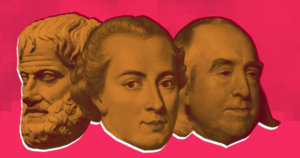 The ethics of classical antiquity thus had two bases to aretê, virtue (understood as citizen formation but with moral values) while the ethics of the sophists who made Greek democracy go into crisis defended a relative truth and man gave up his passions and instincts .
The ethics of classical antiquity thus had two bases to aretê, virtue (understood as citizen formation but with moral values) while the ethics of the sophists who made Greek democracy go into crisis defended a relative truth and man gave up his passions and instincts .
At the beginning of the Roman period, these two currents reappear with the Neoplatonists, Epicureans and Stoics, on the one hand, defending an ascetic morality and, on the other, thinkers such as Cicero and Lucrécio, who included a set of laws and rights in the period of the Roman Empire, of which the modern law has a strong influence, it is what we call the State ethics, to differentiate the concept of ethics from the city-state of Plato and Aristotle who also defended the virtues, the Greek arete.
Although it is not possible to make a clear allusion to the sophists in the period of the Roman empire, their thinkers are legislators, the Neoplatonists are current out of power and take refuge in Christian and Muslim thinkers, such as Saint Augustine, Alfarabi and some Stoic thinkers who would bring influences in the Roman power, like Seneca who was Nero’s tutor, although they defended virtue did not defend an ascetic morality.
Epistemic influences emerge in this period, such as the quarrel with the universals of Boécio and later Abelardo, Duns Scotto and Tomás de Aquino, will resume questions about being and essence, the existence of Universals (what we call the concept) or just private individuals.
In the treatise on virtues Tomás de Aquino made the difference between moral and intellectual virtues, considering that the holy philosopher made a review of Aristotelian ethics, incorporating Christian values, while the moral virtues perfect the speculative and practical aspects, the moral virtues will improve the appetite potentials, name given to the passions and instincts whose discussion comes from the period of the sophists.
Idealistic morality will follow the Kantian maxim: “act in such a way that it can become a universal law”, while creating the transcendental subject outside any religious characteristic, he has a subjective cognitive capacity having: reason, understanding (of the categories ) and sensitivity (pure forms of intuition, space and time), based on this morality that Hegel will elaborate the morality of the State.
In line with Kantian morality, Hegel will elaborate ethics, elaborated on the question of “self-determination of the will”, no longer in subjectivity or in the transcendental, but in the objective unfolding of free wills, that is how the State is the regulator of free wills , and ethics is a quality of ethics, which remains in the private field, and which the State through its laws can make it objective, so the inner moral qualities and virtues are valid only for these aspects and according to the state’s determinations that can interfere in subjective life.
Modern sophistry and practical wisdom
Sophists accredit education and are not born, but because it is a relative age 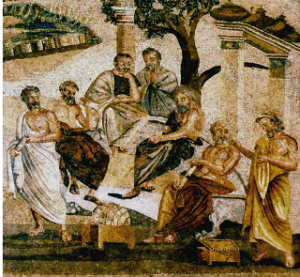 and a code of ethics that prevents or satisfies human instincts and passions, even though Socrates worked out happiness as a combination of virtues (in Greek it means time of moral and political excellence, today in opposite fields), and its method is irony and pharmaceutical.
and a code of ethics that prevents or satisfies human instincts and passions, even though Socrates worked out happiness as a combination of virtues (in Greek it means time of moral and political excellence, today in opposite fields), and its method is irony and pharmaceutical.
We explicitly explain in the post that irony is not about proximity or skepticism, that there are exceptions to Greek origin, but that the Greek word has a definite meaning, but with successive verbs in a discussion that Socrates left against each other . part of his method is mayo-art, which is the art of parity, which is not the end or the social method, because irony takes or the opponent realizes that his preconcepters have the capacity to reflect and only conceive ideas that lead the truth.
We retaliate so much that the sophists assume that, as far as they are concerned, they do not formulate formulas, but that they satisfy their instincts in a way that satisfies the idea of virtuous politics and ethics or at a moderate pace by Socrates when the illusion is natural. because of its instinctive benefits.
Plato, as a disciple of Socrates, does not believe that Socrates himself is in Plato and refuses the Protagoras’ sophistry, or the dialogue that takes place in the virtuous vise, whether incisive or not, and this is the fundamental point for Plato’s birth. , second historians, approximately 384-383 BC, located in the gardens in the suburbs of Athens (pictured in the mosaic of Pompeii, now in the Archaeological Museum of Naples).
It is mandatory to educate or homosexuals for the sake of seriousness and assimilation to the decadence of Greek democracy brought about by the sophist school, so that you can have a relative opinion and verdict, but it is based on whether you are sensible or intelligent, dialectical or basic here, where it will be essential and overcoming doxa, an opinion and a construct of epistemia, knowledge organized in universal universes.
The evolution of dialogues, especially in Plato’s Republic, shows the dialectical evolution (it is not and could not be Hegelian for historical reasons) of the terms of the episteme until it constitutes an ethical structure that leads to the formulation of laws, but ethics as we know it today it comes from the school of one of Plato’s students, Aristotle, who elaborated “Ethics to Nicomachus”, a teleological and eudaimonist conception (Eudaimonia was happiness for the ancient Greeks), around a practical rationality, what the Greeks called phronesis, one of the elements of ethics, that it is logos plus ethos.
Aristotle created then wisdom as a virtue of practical thought, or just practical wisdom, the objective is to describe the phenomena of human action through the dialectical examination of opinions, the residue of the Socratic method, but to discover in them immutable principles, thus it is possible to overcome the doxa and reach episteme knowledge, one can describe this dialectic as knowing-understanding-knowing.
Later Aristotle. one of the students of his Platonic school, is going to do his Lyceum, which was essentially made by walking, therefore also called peripatetics, but the school has a gynasium for physical exercises, and also for socializing the acquired knowledge.
Gadamer’s philosophical hermeneutics will rework the Phrase by systematizing Heidegger’s hermeneutic circle, creating a hermeneutic philosophy.
Sophisms and fake news
Sophism is a wisdom used for convenience in some situation, it may be, for example,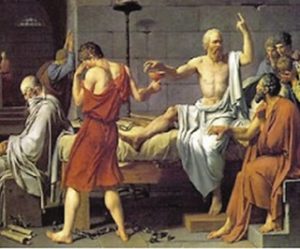 politically correct, or it may be to favor interest groups that has the greatest correspondence with the historical origin of the word.
politically correct, or it may be to favor interest groups that has the greatest correspondence with the historical origin of the word.
They were contemporaries of Socrates, who was opposed to this utilitarian knowledge, the sophists were thinkers who traveled from city to city giving speeches to attract students and charged fees to offer them education, any similarity with modern media is not a coincidence.
Fake News is false news, conspiracy theories and myths that, due to the ease of communication, spread much more quickly, but the half truths of sophisms that spread by sellers of wisdom and maxims without scientific proof and history also exist today, it is just check the price of some speakers who talk about everything, even what they have never studied.
What they sell, happiness with magic formulas, easy success, management models that do not consider the pandemic crisis, although it is true that many make money from it, the honest majority will have difficulties to put their services and products on the market, even with use of the virtual, because the reality is that the economy is in recession worldwide and many aid and solidarity will be needed.
What needs to be said is that easy news, easy success and shallow explanations are often not true, those who seek ease and simplism fall into this trap, but this has happened in all history, Karl Kraus complained in the 1920s that the press it was building a war and it happened, we may be building another, and the leaven of crisis and human difficulties will help this war happen.
Even if we want peace, spreading false news is creating radicalizations, sparking small wars that polarized into big wars, there are well-intentioned people who do this, baseless denunciations and half-truths are there, so at the origin of a fake news is a sophistry, often built by intelligent people who should not favor ignorance.
Dictators know that ignorance favors them, but also those who know the horror of dictatorships and wars can favor them with half truths, to facilitate the exposure of a social, cultural (including religious) and political position is more easy to throw a half-truth, everyone in this or that position is corrupt, fascist or communist, but this is the beginning of a small war.
The truth costs a personal price that is often expensive, but it favors that the war ahead is not waged for an unjust reason, for a stone or a shot fired at an innocent, our daily “wars” against diversity of opinion , they are not dialogues and do not favor peace, in the post-pandemic they need a lot of solidarity and the good will of everyone to overcome difficulties, there is neither happiness nor easy peace.

